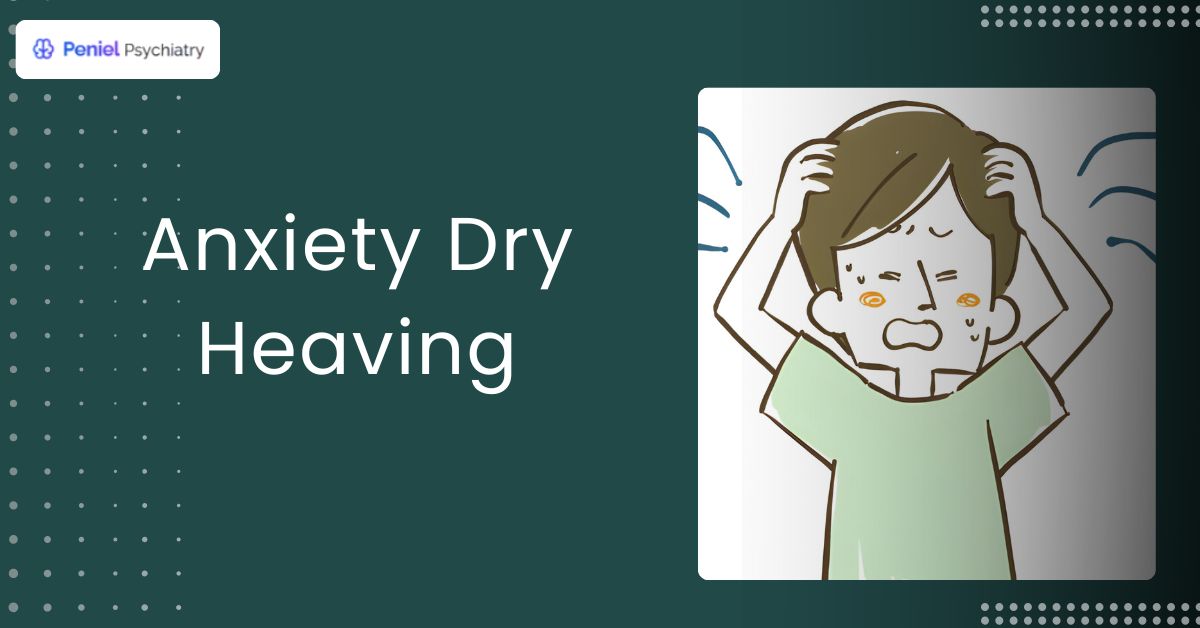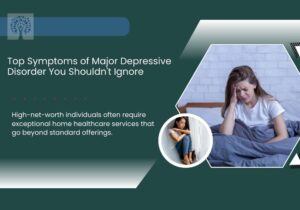Anxiety & Dry Heaving can feel scary and uncomfortable. Many people experience retching without vomiting, a queasy stomach, or nausea during panic attacks or stressful moments. Anxiety affects your nervous system and can upset your gut.
This creates a strong link between stress and digestive reactions. You might notice stomach contractions, acid reflux, or sudden waves of nausea when anxiety rises. Learning why this happens and how to manage it can help you feel more in control.
In this guide, we will explain the causes of anxiety-induced nausea, how it connects to dry heaving, and simple ways to ease discomfort while taking care of both your mind and gut.
Define Anxiety Dry Heaving & Spot the Symptoms
Dry heaving anxiety is when your body makes the motions of vomiting, but nothing comes out. It can feel exhausting and strange. Many people confuse it with actual vomiting, but the difference is clear. Understanding what dry heaving feels like can help you know when it’s just stress and when it might be something more serious.
What Dry Heaving Feels Like
Dry heaving often starts with nausea and stomach discomfort. Your stomach and throat muscles contract as if you are vomiting. Some people feel throat pain or a burning sensation in the chest. You might notice rapid breathing or a queasy stomach. These signs often appear during high stress or anxiety.
How It Differs From Vomiting
Unlike vomiting, dry heaving does not expel the contents of the stomach. Vomiting usually follows a buildup of nausea and may leave you feeling weak or dehydrated. Dry heaving can happen without eating anything triggering it. Anxiety-induced nausea or panic attack nausea often causes these dry retches.
Common Symptoms to Watch
- Stomach contractions or cramps
- Throat tightness or pain
- Waves of nausea
- Acid reflux or upset stomach
- Retching without vomiting
Discover why anxiety can trigger vomiting in adults. Learn about the common causes, warning signs, and effective treatments to manage anxiety-induced nausea and protect both your mind and digestive health naturally.
When It May Need Attention
Dry heaving is often harmless. It can pass when anxiety reduces or after a calming activity. But if it lasts more than a few days, causes dehydration, or comes with blood in vomit, you should see a doctor. Understanding these signs helps you manage anxiety-induced nausea safely.
Connect Anxiety to the Gut
Anxiety doesn’t just stay in your mind. It can affect your stomach and digestion. When you feel stressed, your nervous system activates. This triggers the “fight or flight” response. Your heart races, breathing changes, and your gut reacts. Many people notice butterflies, nausea, or acid reflux when anxiety spikes.
How the Nervous System Affects Digestion
The autonomic nervous system controls automatic body functions. When anxiety rises, it slows digestion and makes the gut sensitive. Food moves more slowly, and stomach muscles tighten. This reaction can trigger dry heaving or nausea.
Common Gut Reactions to Anxiety
- Queasy stomach or nausea
- Stomach cramps
- Acid reflux or heartburn
- Retching without vomiting
- Sudden loss of appetite
Why Dry Heaving Happens
When the gut is sensitive, even mild stress can cause strong reactions. Rapid breathing or muscle tension can irritate your throat. Panic attacks and anticipatory anxiety often bring waves of nausea. Individuals with GERD or a sensitive stomach may experience these effects more intensely.
Understanding the link between anxiety and the gut helps you notice triggers. It also makes it easier to manage anxiety-induced nausea before it leads to dry heaving. Paying attention to your body is the first step toward relief.
How Anxiety Triggers Dry Heaving
Anxiety can make your stomach react in powerful ways. When stress rises, it activates nausea reflexes in your body. This means your stomach and throat muscles tighten, creating the urge to retch even when your stomach is empty. Many people notice this during panic attacks or stressful events.

How Muscle Tension Plays a Role
Tension in the diaphragm or esophagus can exacerbate dry heaving. Tight muscles push against the stomach and throat. This motion mimics vomiting, even if nothing comes out. Rapid breathing, common in anxiety, can also irritate the throat and trigger retching.
Situations That Trigger Dry Heaving
- Panic attacks or sudden fear
- Anticipatory anxiety before stressful events
- High-stress situations at work or home
- Overthinking or worrying about health
Risk Factors
Certain conditions increase the likelihood of dry heaving. People with GERD or a sensitive stomach feel nausea more easily. Acid reflux, prior stomach issues, or anxiety-related gut sensitivity can all contribute.
By understanding how anxiety triggers dry heaving, you can better notice early warning signs. Recognizing these patterns helps you manage nausea before it becomes intense. Small steps, such as slowing your breath and relaxing your body, can effectively reduce symptoms.
Rule Out Other Possible Causes
Not all dry heaving comes from anxiety. Sometimes, medical conditions or other factors play a role. Knowing the difference helps you take the proper steps.
Gastrointestinal Causes
Stomach issues can trigger nausea or dry heaving. These include:
- Acid reflux or GERD
- Ulcers or gastritis
- Stomach infections
Motion and Inner Ear Problems
Motion sickness or inner ear issues can cause nausea and upset your stomach. They may cause nausea, dizziness, or retching.
Medication Side Effects
Certain medicines can irritate the stomach. They may trigger nausea or dry heaving. Always check labels and consult your doctor if symptoms appear after taking medication.
When to See a Doctor
Dry heaving typically subsides once the stress is alleviated. But you should see a doctor if:
- It lasts more than a few days
- You vomit blood or see unusual colors in vomit.
- You experience significant weight loss or dehydration.
Understanding other causes ensures you don’t miss serious health issues. It also helps you focus on the proper treatment, whether that’s managing anxiety, adjusting your diet, or treating gut problems.
Spot Red Flags & Seek Help
While dry heaving is often linked to anxiety, some signs mean it’s time to get help. Knowing these red flags can protect both your mind and body.
Physical Warning Signs
Watch for symptoms that go beyond typical stress reactions:
- Blood in vomit or dry heaving
- Severe dehydration
- Unexplained weight loss
- Persistent stomach pain
Mental Health Red Flags
Anxiety-related dry heaving can signal deeper mental health issues if it’s frequent or intense. Be alert to:
- Panic attacks that occur often
- Severe anxiety or constant worry
- Obsessive thoughts that trigger nausea
When to Act
If any red flags appear, don’t wait. Contact a doctor or mental health professional. Early attention can prevent complications and help you manage both anxiety and gut reactions.
Being aware of warning signs helps you act quickly. It also gives you peace of mind, knowing when dry heaving is just a result of stress and when it could be a sign of something more serious.
Coping Strategies and Remedies for Dry Hemorrhoids
Managing anxiety-related dry heaving starts with simple steps. Quick relief can help calm your stomach and body when nausea hits.

Quick Relief
- Practice deep breathing to slow your heart and relax your muscles.
- Sip water or ginger tea to soothe your stomach.
- Try grounding techniques or gentle relaxation exercises to help you feel more grounded.
- Sit upright and loosen tight clothing to ease pressure.
Short-Term Care
- Eat bland foods and avoid foods that irritate your stomach.
- Time meals carefully to prevent nausea after eating.
- Improve sleep habits to reduce stress.
- Take light walks after meals to support digestion.
Professional Treatments
- Cognitive-behavioral therapy (CBT) can reduce anxiety triggers.
- Ask your doctor about medications, such as antiemetics or SSRIs.
- Treat gut issues with acid reducers or probiotics.
- Body awareness therapies help calm muscle tension and nausea.
These strategies can make a big difference in daily life. Combining quick relief, short-term care, and professional support helps manage anxiety-induced nausea effectively. If you need tailored care, contacting a trusted mental health resource, like Peniel Psychiatry, can provide guidance and support.
Build Long-Term Prevention Habits
Preventing anxiety-related dry heaving means taking care of both your mind and gut over time. Small daily habits can make a big difference.
Manage Anxiety
- Practice mindfulness or journaling to calm your mind.
- Attend therapy sessions to learn coping strategies.
- Use relaxation exercises to reduce stress and tension.
Reduce Stress
- Exercise regularly to release tension and improve digestion.
- Engage in hobbies and activities that bring you joy and fulfillment.
- Connect with supportive friends or family.
Support Digestive Health
- Schedule regular checkups to monitor gut health.
- Eat balanced meals and avoid foods that cause stomach problems.
- Notice early signs of nausea or dry heaving and act early.
Strengthen Resilience
- Build routines that keep stress levels manageable.
- Recognize triggers and plan ways to respond calmly.
- Combine mind and body care to prevent dry heaving from anxiety.
Long-term prevention helps you feel more in control. By caring for your mental health, reducing stress, and supporting digestion, you can lower the chances of anxiety-induced nausea and dry heaving.
Real-Life Case
Sometimes, seeing how others manage anxiety-related dry heaving can help. Real-life examples make the process easier to understand.
Case Example
Sarah, a 28-year-old, noticed she often dry heaved during panic attacks. She felt nausea, stomach tightness, and occasional acid reflux. At first, she tried to ignore it, but the symptoms affected her daily life.
Steps That Helped
- She started practicing deep breathing whenever anxiety rose.
- She adjusted her meals, choosing bland foods and avoiding irritants.
- She attended therapy to manage stress and anticipatory anxiety.
- She used light exercise and journaling to reduce tension.
Results
Over the course of a few months, Sarah noticed a decrease in episodes of dry heaving. Her anxiety became more manageable, and she felt more in control of her body. Simple daily routines and professional support made a big difference.
Sharing experiences like this shows that anxiety-induced nausea can be handled. With the right strategies and guidance, dry heaving doesn’t have to control your life.
Frequently Asked Questions (FAQs)
Why do I dry heave when I feel anxious?
Anxiety activates your nervous system. This can upset your gut and trigger nausea or retching. Muscle tension and rapid breathing increase the likelihood of dry heaving.
Does anxiety cause vomiting?
Anxiety usually causes dry heaving, not vomiting. But in some cases, severe nausea can lead to actual vomiting.
How long does anxiety dry heaving last?
It often passes once stress reduces. Short episodes can last a few minutes, while longer ones may last hours. Chronic anxiety may cause repeated episodes.
What relieves anxiety and nausea fast?
Try deep breathing, sipping water or ginger tea, and relaxing your body. Sitting upright or practicing grounding techniques can also be beneficial.
When should I worry about dry heaving?
See a doctor if it lasts more than a few days, causes dehydration, or comes with blood in vomit. Persistent symptoms may indicate medical issues or severe anxiety that needs attention.
Is dry heaving a sign of anxiety?
Yes, dry heaving can be a physical symptom of anxiety and intense stress.
Anxiety triggers the body’s “fight-or-flight” response, which releases stress hormones like adrenaline and cortisol. These hormones divert blood flow away from the digestive system and can disrupt its normal function, leading to various gastrointestinal symptoms, including:
Nausea and an upset stomach
A “churning” or “butterflies” sensation
Gagging and, in some cases, dry heaving or vomiting.1
For some individuals, especially those with anxiety disorders or panic attacks, the gag reflex can be highly sensitive and triggered by psychological stress, resulting in the feeling of dry heaving.
Important Note: While anxiety is a known cause of dry heaving, it is also associated with many other conditions, including:
Gastrointestinal issues (like GERD or IBS)
Excessive alcohol consumption or dehydration
Certain medications (including some anti-anxiety or antidepressant drugs)
Infections or low blood sugar
If you frequently experience dry heaving or chronic nausea, it is important to consult a doctor or other healthcare professional to determine the underlying cause and receive appropriate treatment
Wrap Up With Key Takeaways
Anxiety and dry heaving are closely linked. Stress can upset your gut, cause nausea, and trigger retching without vomiting. Understanding this connection helps you manage your symptoms more effectively.
Key Points to Remember
- Anxiety can activate the nervous system and affect digestion.
- Dry heaving is often harmless but may signal deeper issues if persistent.
- Quick relief, short-term care, and professional support help reduce symptoms.
- Long-term habits, such as practicing mindfulness, engaging in regular exercise, and maintaining a balanced diet, can help prevent future episodes.
Seek Support When Needed
If dry heaving lasts more than a few days or is accompanied by warning signs, contact a doctor. Mental health professionals, such as those at Peniel Psychiatry, can offer guidance and personalized care.
By learning how anxiety affects your stomach and using practical strategies, you can reduce nausea and feel more in control. Paying attention to your mind and body is the best way to protect both.
Provide References & Resources
Reliable information can help you manage anxiety and dry heaving. Using trusted sources ensures you get accurate guidance.
Medical References
- Peer-reviewed journals on anxiety and gastrointestinal health.
- Research on stress, nausea, and the autonomic nervous system.
- Studies on anxiety-induced dry heaving and its treatment options.
Trusted Mental Health Resources
- Peniel Psychiatry articles on anxiety management.
- Professional therapy and counseling services.
- Support groups for anxiety and stress-related digestive issues.
Book your appointment today with Peniel Psychiatry. Get expert care for anxiety, nausea, and dry heaving. Professional support is just one step away to help you feel better and healthier.
Using these references helps you understand anxiety-induced nausea better. Combining knowledge with practical strategies gives you control over dry heaving. Always consult professionals when symptoms persist or worsen.




